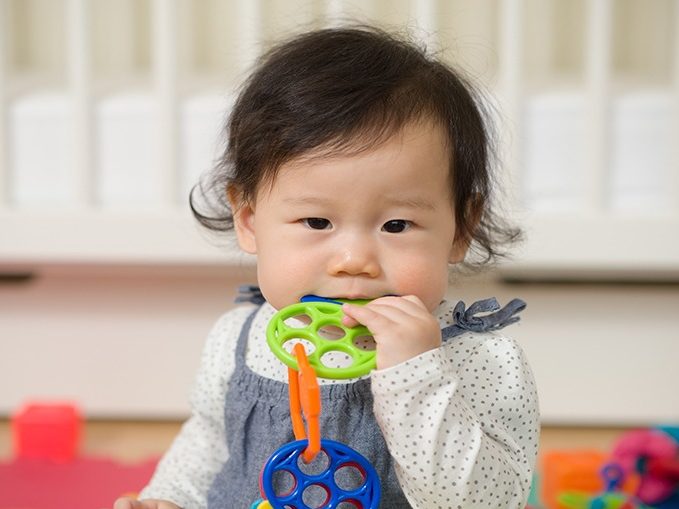Teething can be a challenging time for parents and baby, and the true signs and symptoms are sometimes misunderstood.
Dr. Aaron Van Ningen, a pediatrician at the Sanford Children’s North Clinic in Bismarck, North Dakota discusses what’s going on in your baby’s mouth.
Understanding teething
Teething is a normal developmental stage and involves the process of teeth growing and then breaking through the gums. Teeth begin to develop while a baby is in the womb, with tooth buds forming in the gums. Once developed, they break through the gums, which can take months.
When do babies start teething?
Usually the first teeth begin to break through between the ages of 5 to 7 months. However, some babies experience it earlier or later. In fact, though rare, a baby can be born with one to two teeth, and some babies do not get their first tooth until after age 1. Most often the bottom middle teeth break through first, followed by the four upper middle teeth. By 30 months old — or 2-1/2 years — all 20 baby teeth are usually present.
How to tell if a baby is teething
The most common signs of teething include fussiness, gnawing or chewing on fingers or fists continuously, sensitive and swollen gums, and increased drooling. The drooling may start months before teeth break through the gums — at 3 or 4 months of age — and is not always related to teething.
Until recently, experts attributed teething to all ailments during the timeframe. But now, it is understood that a baby should see a pediatrician if a fever occurs or symptoms are more severe than fussiness, irritability, drooling and gnawing.
Do babies get fevers and runny noses when teething?
Teething does not cause fever, rashes, diarrhea or colds, but it can make a baby uncomfortable. Crying should not increase due to teething, nor does teething increase susceptibility to getting sick.
If your baby is teething and becomes sick or appears more fussy than usual, symptoms should be evaluated independent of teething. Blaming teething can lead to a delay in necessary medical attention for an infection, such as an ear infection or urinary tract infection. A baby’s pediatrician should be contacted for advice if concerns arise.
At this age, babies have other variables affecting their risk of infection. The loss of antibodies transferred to baby from a mother at the time of birth occurs at around 6 to 12 months of age, and the developmental milestone of chewing on everything also begins. Both increase a baby’s risk of infection.
Ways to ease discomfort
To soothe discomfort, provide hard rubber toys, teething rings or cold teething toys to chew on. Teething toys and rings should not be frozen as these can hurt or damage baby’s gums. Due to teething gels quickly washing off from excessive drooling, they are not considered helpful.
Try to rub baby’s gums with a clean finger to ease discomfort. Applying something cold on the gums is more effective at soothing and numbing the gums. Do not give your baby any medication without first contacting their pediatrician.
Learn more
- Healthy baby teeth lead to healthy permanent teeth
- Biting: Why it happens and what to do about it
- Why your baby may be crying, and tips for soothing
…
Posted In Bismarck, Children's, Health Information, Parenting
